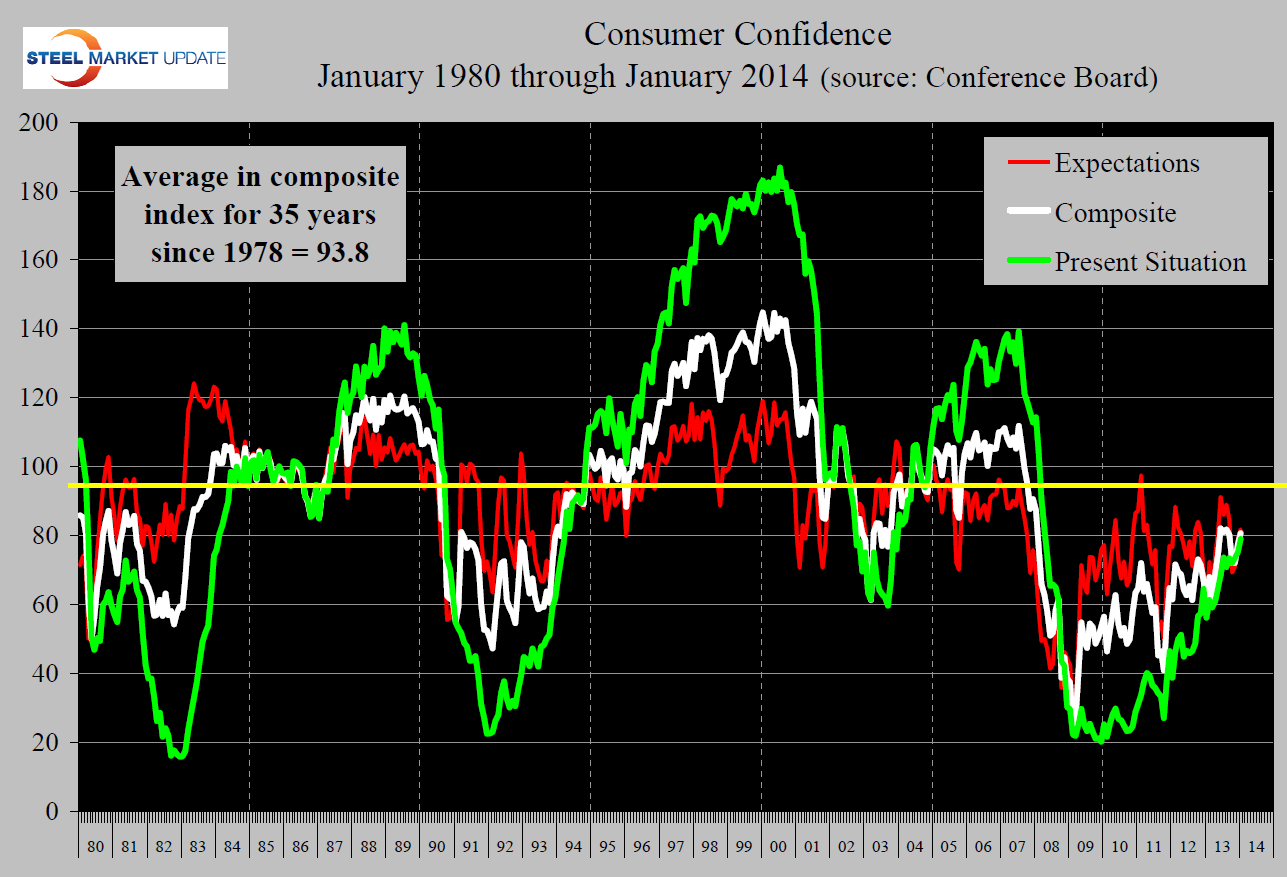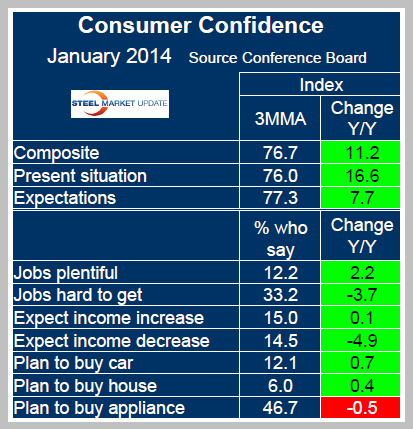Market Data

January 30, 2014
Consumer Confidence- January 2014
Written by Peter Wright
Both the expectations and the view of the present situation improved in the mind of consumers in January according to the latest Conference Board analysis. We thought it would be interesting to take a longer term view this month because our past analyses have been somewhat overshadowed by the surging confidence of the late 1990s.
 If we look back to 1980 the average composite monthly value of confidence has been 93.8. The result for January 2014 was 80.7 with a three month moving average of 76.7, still a ways to go to reach the long term average (Figure 1). On a year over year basis the composite value is up by 11.2, expectations are up by 7.7 and the view of the present situation by 16.2 (Table 1). The view of the job market is still poor but improving and more people expect a wage increase than a decrease. Consumers buying plans for automobiles and houses are improving but for appliances are falling. (Source: The Conference Board)
If we look back to 1980 the average composite monthly value of confidence has been 93.8. The result for January 2014 was 80.7 with a three month moving average of 76.7, still a ways to go to reach the long term average (Figure 1). On a year over year basis the composite value is up by 11.2, expectations are up by 7.7 and the view of the present situation by 16.2 (Table 1). The view of the job market is still poor but improving and more people expect a wage increase than a decrease. Consumers buying plans for automobiles and houses are improving but for appliances are falling. (Source: The Conference Board)
The official Conference Board news release reads as follows:
The Conference Board Consumer Confidence Index Increases Again
The Conference Board Consumer Confidence Index, which had rebounded in December, increased again in January. The Index now stands at 80.7 (1985=100), up from 77.5 in December. The Present Situation Index increased to 79.1 from 75.3. The Expectations Index increased to 81.8 from 79.0 last month.
The monthly Consumer Confidence Survey, based on a probability-design random sample, is conducted for The Conference Board by Nielsen, a leading global provider of information and analytics around what consumers buy and watch. The cutoff date for the preliminary results was January 16.
“Consumer confidence advanced in January for the second consecutive month,” said Lynn Franco, Director of Economic Indicators at The Conference Board. “Consumers’ assessment of the present situation continues to improve, with both business conditions and the job market rated more favorably. Looking ahead six months, consumers expect the economy and their earnings to improve, but were somewhat mixed regarding the outlook for jobs. All in all, confidence appears to be back on track and rising expectations suggest the economy may pick up some momentum in the months ahead.”
Consumers’ assessment of overall present-day conditions continues to improve. Those claiming business conditions are “good” increased to 21.5 percent from 20.2 percent, while those claiming business conditions are “bad” edged down to 22.8 percent from 23.2 percent. Consumers’ appraisal of the labor market was also more positive. Those saying jobs are “plentiful” ticked up to 12.7 percent from 11.9 percent, while those saying jobs are “hard to get” decreased slightly to 32.6 percent from 32.9 percent.
Consumers’ expectations, which had improved sharply in December, increased again in January. Those expecting business conditions to improve over the next six months remained unchanged at 17.4 percent, while those anticipating business conditions to worsen decreased to 12.1 percent from 13.9 percent. Consumers’ outlook for the labor market was mixed. Those expecting more jobs in the months ahead declined to 15.4 percent from 17.1 percent. However, those anticipating fewer jobs decreased to 18.3 percent from 19.4 percent. The proportion of consumers expecting their incomes to increase rose to 15.8 percent from 13.9 percent, while those anticipating a decrease in their incomes declined to 13.6 percent from 14.3 percent.








